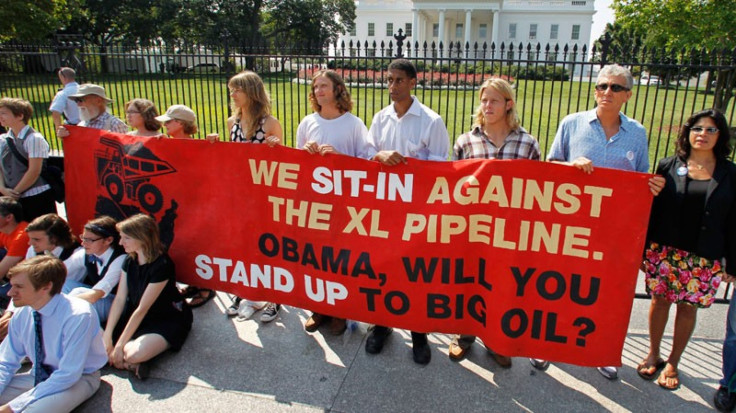TransCanada's 'Misleading' Keystone XL Job Creation Numbers Targeted in SEC Complaint

TransCanada, the Canadian energy company seeking to construct the proposed Keystone XL pipeline in the U.S., could face an inquiry into whether it deceived investors by inflating the job-creation potential of the highly-disputed pipeline from one of the nation's most well-known environmental advocacy groups.
Greenpeace filed a complaint with the U.S Securities and Exchange Commission Thursday alleging TransCanada made false or misleading statements about the project, citing evidence from the company's Canadian filings and the U.S. Department of State to show that the project would create less than 7,000 jobs -- if that -- in the U.S. The company had said as many as 20,000 jobs could be created. The pipeline would extend from the Canadian border to the Gulf of Mexico if fully developed.
Although the Obama administration last week rejected a Feb. 21 deadline to approve it, the Keystone XL pipeline battle is far from over. The project has been championed by congressional Republicans -- as well as some Democrats -- who tout TransCanada's job creation figures as evidence the project would inject life into the U.S. economy.
Greenpeace's complaint alleges TransCanada, based in Calgary, Alberta, reported that each mile of pipeline constructed in the U.S. would create American jobs at a rate that is 67 times higher than job creation totals given by the company to Canadian officials for the Canadian section of the pipeline.
These false and misleading job creation numbers are part of [TransCanada's] lobbying and public relations campaign designed to create congressional pressure on the U.S. government to issue a Presidential Permit approving construction of [Keystone XL], states the complaint, emphasizing how government approval is key to getting the project off the ground.
Greenpeace, whose U.S. office is in Washington, alleged TransCanada purposely misled investors, the U.S. and Canadian governments, the media and the public at large in order to bolster its balance sheets and share price. The organization claims those statements violate U.S. securities disclosure laws.
TransCanada's U.S. shares Friday traded at $41.50, down 27 cents, giving the Canadian energy giant a market capitalization of $29.2 billion.
The job creation figure publicized by TransCanada -- which is a central component of its lobbying and public relations campaign in the U.S. -- comes from a report the company commissioned from economist Ray Perryman, the complaint said. Based on the report, TransCanada claimed the $7 billion project would create 20,000 high-wage construction and manufacturing jobs in the U.S. alone, in addition to creating another 118,000 spin-off jobs.
However, the complaint points out the Perryman report didn't reveal the methodology or data inputs that were used to derive those figures.
Using TransCanada's figures, the State Department concluded fewer than 1,000 U.S. workers would be hired. Meanwhile, the Canadian National Energy Board reported the socio-economic impacts of the Keystone XL Project will be of a temporary nature and limited to the relatively short duration of pipeline construction without significant long term effect on the surrounding communities.
The five biggest multinational oil companies spent more than $100 million on lobbying expenditures in 2011, the Center for Responsive Politics said Some of the project's biggest champions in Congress received hundreds of thousands of dollars from oil and gas industry lobbyists in 2012 alone, including Senate Minority Leader Mitch McConnell (R-Ky.) House Speaker John Boehner (R-Ohio) and House Majority Leader Eric Cantor (R-Va.).
© Copyright IBTimes 2025. All rights reserved.




















